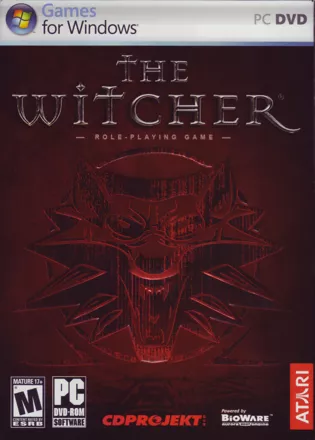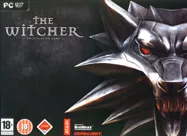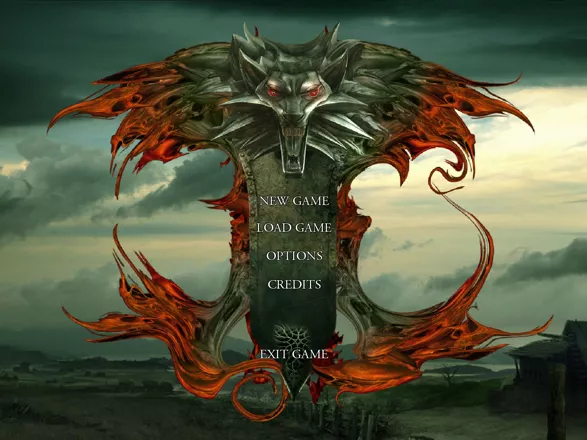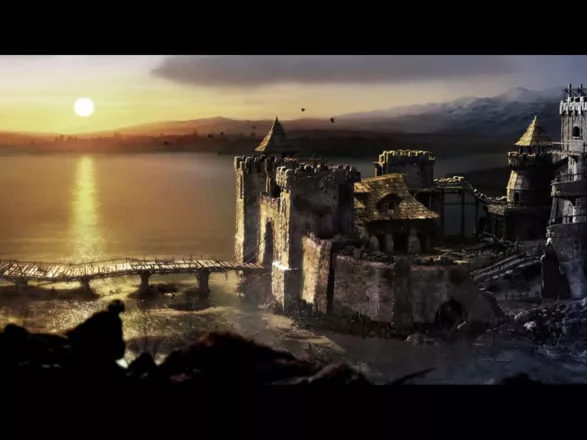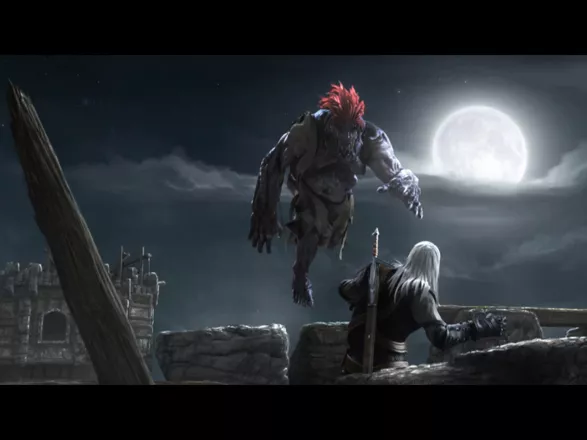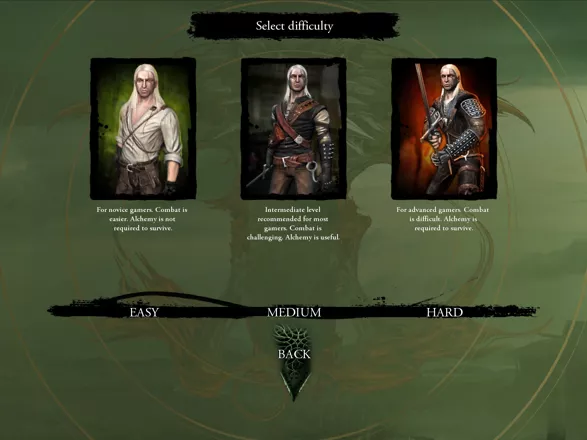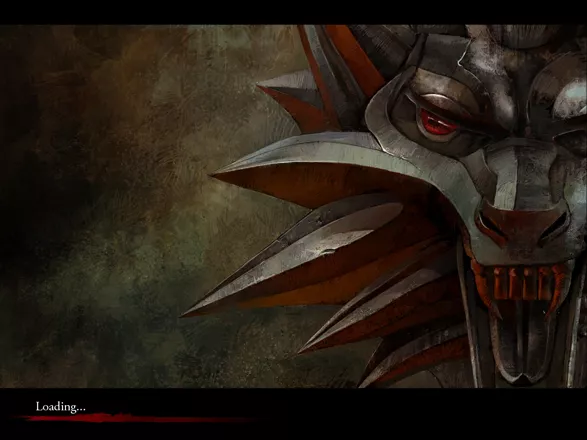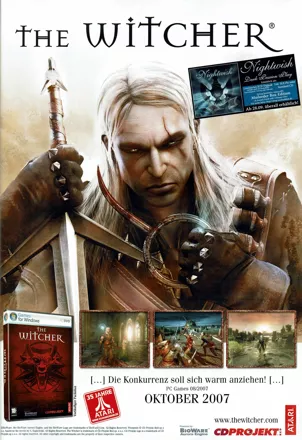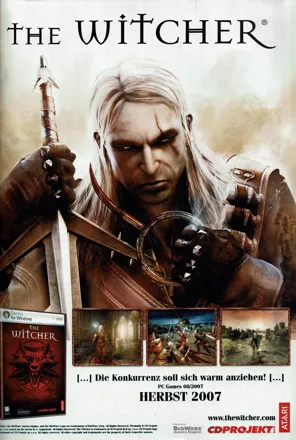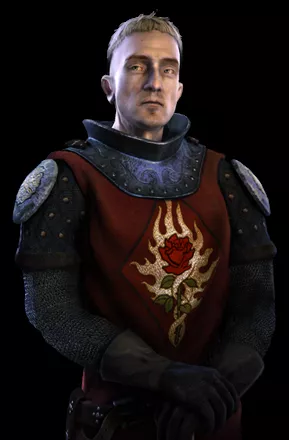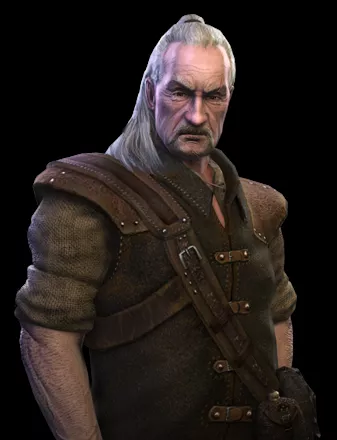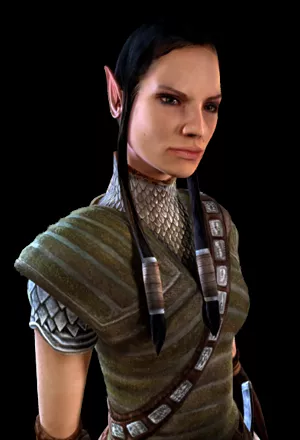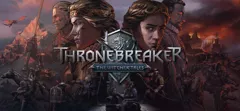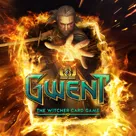The Witcher
Description official descriptions
Based on the books by the Polish fantasy author Andrzej Sapkowski, The Witcher is an addition to the RPG genre from Europe, starring the main character from the books - Geralt of Rivia, who is a "witcher" - a professional monster-slayer.
The story begins when Geralt is found unconscious by his fellow witchers. He has lost most of his memories of the past, and joins other witchers when their fortress, Kaer Morhen, is attacked by members of a mysterious organization known as the Salamandra. Most of the enemies are defeated by the witchers, but the two most dangerous ones - a criminal nicknamed "Professor" and the sorcerer Azar Javed - escape after having gained access to the witchers' laboratories. The witchers part ways, and Geralt heads to the capital city Vizima, hoping to find more information about the assailants.
The Witcher is a dark game with a dark world. War, murder, poverty, genocide, discrimination, torture, fanaticism - are just a few words that describe this setting. This is the world that the humans try to rule, and non-humans like elves and dwarves are subjected to suspicion and sometimes cruel treatment. Will Geralt be a victim to a few sentimental moments of kindness, or will he survive as a cynical bitter murderer? These are the choices that you'll have to make.
Using a heavily modified engine of Neverwinter Nights, the game implements an original combat system, which requires the player to click on the enemy at the right moment in order to help Geralt execute combo attacks. In order to defeat the enemies efficiently, the player must observe the movements of the combatants, and choose the right combat style: "quick", which is recommended to use against fast enemies, "heavy", with lower precision, but more damage output, and "group", which is effective when Geralt is surrounded. In addition, Geralt often has to switch between his two basic weapons: the steel sword, which is used against regular enemies, and the silver sword, which is more helpful against supernatural creatures.
Character growth is handled by allocating experience points into skills, teaching Geralt fighting styles as well as learning and improving his abilities. Alchemy is a skill that Geralt learns, allowing him to create his own potions, for healing purposes as well as for enhancing his witcher senses. Geralt can also learn and cast offensive and defensive magical spells.
The Witcher requires the player to make ethical decisions for Geralt, which often have "delayed consequences" - for example, sparing a character's life early in the game will eventually trigger a scene much later, in which said character appears and helps Geralt in return for his kindness. As the game's plot advances, the player learns more about the social and political life of its world, and is able to choose his/her own path and alliances to different organizations and ideologies.
Spellings
- Ведьмак - Russian spelling
- 巫师 - Simplified Chinese spelling
- 巫師 - Traditional Chinese spelling
Groups +
- 3D Engine: Aurora
- Fantasy creatures: Dragons
- Fantasy creatures: Dwarves
- Fantasy creatures: Elves
- Gameplay feature: Alchemy
- Gameplay feature: Brothels
- Gameplay feature: Character development - Skill distribution
- Gameplay feature: Dating / Romance
- Gameplay feature: Day / night cycle
- Gameplay feature: Gambling
- Gameplay feature: Hunting
- Gameplay feature: Journal
- Gameplay feature: Multiple endings
- Games for Windows releases
- Games made into comics
- Inspiration: Literature
- Nudity
- Scripting language: Lua
- The Witcher licensees
- The Witcher series
- Theme: Amnesia
- User / fan contributed content
Screenshots
Promos
Videos
See any errors or missing info for this game?
You can submit a correction, contribute trivia, add to a game group, add a related site or alternate title.
Credits (Windows version)
586 People (531 developers, 55 thanks) · View all
| Game Vision | |
| Project Lead | |
| Head of Art | |
| Head of Production | |
| CEO of the Studio | |
| Assistant Producer | |
| Asset Production Manager | |
| Production Coordinators | |
| Executive Assistant / Production | |
| Special Acknowledgements | |
| Chief Designer | |
| Lead Story Designer | |
| Dialogue | |
| Additional Dialogue | |
| Story Designers / Scripters | |
| [ full credits ] | |
Reviews
Critics
Average score: 85% (based on 87 ratings)
Players
Average score: 4.1 out of 5 (based on 113 ratings with 5 reviews)
The Good
It took me some time to write a proper review for The Witcher. At first I tried to focus on the significance this game has, on the fascination I experienced about the fact that unknown Polish developer has managed to challenge the established leaders of the genre and even surpass them in some areas. I wanted you to see the game’s utmost importance, to fill you with resonance, I am certain, The Witcher should have in the gaming community. Yet, in the end, I overlooked one of the most important things I have to say about this game.
Just, what exactly it means to me, personally? If you will, I’ll start precisely with that.
The Witcher helped me to realize what my gaming preferences are. I have been playing for over sixteen years, I’ve completed hundreds of different games, but I’ve never really managed to say properly what fascinates me the most about games, what my exact tastes and preferences are.
Now I can tell you. Here they are, on one DVD worth of data.
What separates The Witcher from many other games of many different genres is that it’s a game that has something to say to us and that it uses every aspect of it to communicate that message. Everything, including graphics, sound, gameplay, non-linearity, dialogs and even combat is there for a reason, besides simply “for the fun of it”. The game is a major step in the most interesting of the directions the games are facing. It makes you a better person and it shows you the reason for the things and people around you to exist. The Witcher makes bold moves and takes huge risks, yet succeeds in all of them.
When playing The Witcher, I have often been confronted with a certain peculiar feeling. It’s rather hard to describe. I have to say, that I was sure I was witnessing the ultimate truth about nearly everything. “Here it is! That’s the truth.” I wanted to exclaim on numerous occasions. Partly that can be attributed to the excellent source material, series of short stories and novels written by a brilliant Polish writer -- Andrzej Sapkowski. He managed to portray an extremely faulted and corrupted world, maybe even more faulted than the one you and I live in, and then, through the eyes of Geralt, a monster hunter, he uncovered every vice, every despicable thing and person in such world, and pointed at them with his finger, asking you, if you are any better.
The game is shaped in exactly the same vein. Be prepared to be subjected to the issues, you weren’t even considering. The Witcher has commented on many different things, including terrorism, love, friendship, greed, power, loyalty, destiny, prostitution, alcoholism, drugs, life, death, fear, prejudices, racism, faith and even more. Its quire remarkable, that with such a large scope of topics covered, the game has managed to remain coherent in its story and general theme.
But what’s even more important, is that, being a game, The Witcher allows you to engage into a discussion with it. It opens up a dialog with a player trying to anticipate any response he might have. You have your say in every controversial topic the game presents. Express your will through your actions and see the world around you respond to your decisions. Trust me, the result will not only surprise, but will have you reconsider your decision in the first place. The game doesn’t try to impose its message upon you in an intruding fashion. It poses a problem, asks for your opinion and presents you with a consequence, which is bound to make a better person out of you, more considerate in your actions, more thoughtful in your decisions, and most importantly -- less indifferent and apathetic. This is a goal a true piece of art is destined for.
Another thing that fascinates me about The Witcher, is that it applies all that choice & consequences stuff one of the most beautiful shapes of a game I have ever had the pleasure of seeing. More so, it takes advantage of its visuals and sounds to support the claims the game make in the ideology department. It’s not very convincing to see a packed, asphyxiating life of a big city, full of different races and class segregation without all the marvelous art CD Projekt RED has powered their game with. The same goes for the serene atmosphere of the Murky Waters village, the rural image of which, painted in pastel tones, provides an excellent background to the peaceful and seclusive life of the village, making it even more shocking for you to unwillingly bring despair and the politics of the “big world” into it. Every character, every location is blooming with detail and shows a great talent put in it.
And as I said, the fact that this beauty works for a cause, elevates it infinitely higher than anything you might see in a Final Fantasy game, where unfortunately, the beauty exists only for a beauty’s sake.
The whole previous paragraph may be repeated in regard to the music as well. The Witcher features the most diverse and thought-out soundtrack. Be it an aggressive combat tune, or a small interlude presenting a new location, the music of Pawel Blaszczak and Adam Skorupa is jam-packed with life and spark so often absent in the generic fantasy tracks of even the most talented of game composers. And once again, its not the quality of the music itself that strikes me the most, but the undeniable bond that ties the music to the environment and the story it backdrops. A game composer, as a movie composer, isn’t as free in his creativity as your average musician is. He has to reflect and extend upon the things being witnessed in the game, by his music, highlighting the elements and things worthy of additional attention. That’s how it is in The Witcher, and that’s how it must be done, period.
But many games prior to The Witcher’s release had excellent music, thought-provoking story and artistically ambitious graphics. What separates this particular game from the likes of Fallout, Baldur’s Gate 2 or Planescape: Torment? A distinct difference between those games and The Witcher lies in the fact, that unlike those games, The Witcher has finally come in terms with its gameplay mechanics. I wasn’t among the crowd who was impressed with Baldur’s Gate appliance of AD&D rules; I didn’t see how dice-driven combat, even if tactically flexible, emphasized the overall theme of the game. I don’t think a good game is made of a turn-based, Fallout-type of combat either. Both of those variants were fun, but they didn’t carry a message with them. There was no point to those battles, except for refreshing a rather thrill-less formula of dialog-driven gameplay. Planescape: Torment has tried to approach that problem, but resulted in a very uneven mix, in which the starting portions of the game were dedicated to talking and exploring, while the later were totally given way to the spectacular but unnecessary fighting.
The Witcher closes its eyes on its competitors. It does away with all the save rolls, +3 artifacts, or unnecessary augment effects. It eliminates the plague of modern RPGs, known as “phat loot” syndrome, which although might be engaging on its own, hardly brings any additional facet to the idea the game is conveying. Secondly, the game makes a huge emphasis on knowledge gathering, rather on application of that knowledge. Alchemy, combat, item management – every aspect of gameplay requires to be researched first. The bigger part of the gameplay is devoted to analyzing and making choice rather than implementing it. And during that process, the player unwillingly learns about the gameworld he plays in, he begins to understand it better through the series of his own experiences. That creates an additional level of depth, only a video game is capable of.
Take a look at the game’s bestiary, for example. Unlike any other fantasy novel/game/movie you have seen, the monsters roaming the land are not an evil threat from far-away lands guided by a mysterious, yet inevitably evil force. The monsters in The Witcher are the products of a man himself. In the fashion of Shakespearean Hamlet, Sapkowski takes use of the supernatural elements in his stories, only if they will serve a necessary dramatic function. Just like in Hamlet, a man-devouring plant grows in backyard, because “a murder most foul and unnatural” has taken place there, and not without a help of this backyard’s owner.
A character in the game suggests that every monster you encounter is a personification of each of the man’s vices. An image of war, for example, wouldn’t be so astonishing in The Witcher, if not for a dozen of Graveirs attracted to the battlefield by a smell of rotting corpse. So all the supernatural elements used in game are designed to emphasize the most horrific of the humanity’s acts, which I find impossible to call “natural”.
I must stop there, because the length of this review has already exceeded any levels of decency and respect for the reader. But there’s so much I haven’t tell you about this game yet. The brilliant writing, borrowing its style directly from the books, tragic characters, a deep and dark (but not morbid) sense of humor, luxurious and most importantly unintrusive cutscenes, lots of fascinating “character moments” and even dozens of eastern eggs, a careful eye will take a pleasure of finding.
Well, I guess, these are things you will have to discover on your own.
The Bad
I would hardly grant myself a liberty of nit-picking a game that took so much effort and colossal dedication to make. So, it isn't exactly your average Mobygames bad section, but a certain set of wishes for CDProjekt RED plans for the future.
Wish number one. However excellent the story presented in the game is, I can’t brush off the feeling that the game relies on its source material a bit too heavily. Don’t misunderstand me, you most certainly is under no obligation to read any of the Sapkowski’s books to enjoy the game. It’s just that the game doesn’t introduce any elements or themes, which haven’t been seen in the novels before. The Witcher is certainly no Knights Of the Old Republic, when it comes to extending upon the existing franchises and universes. I wish, that in the next installment of The Witcher, (which is inevitable, at least judging by the outro) the developers would try to take some liberties and expand themes and images we have already a very good knowledge of.
Wish number two. I don’t think there’s much difference if the game requires you to click every time you make a hit, once in a while or only once. It’s making battles meaningful what’s important. So, I don’t think that completely revamping the game’s combat system was called for. I could’ve easily been satisfied with a Diablo clickfest, as long as there’s an idea or a message being conveyed through those clicks. So, please, CDProjekt, instead of spending sleepless night trying to come up with combat that will satisfy any obsessed Oblivion hater out there, try to extend on the idea of meaningfulness and reason for those combat scenes to exist in the first place.
Wish number three. I hope CDPR will make enough money of The Witcher, to solidify its position as a king of the modern age RPG. So far, it was an extremely good shot, but it’s too early to say, if it was by chance or by the providence.
Wish number four. I hope next time CDProjekt will be allowed to have a personal control over all the localized versions of the game. That kind of high quality stuff should not be brought down by a short-sighted and greedy publisher. Atari, don’t take a promising developer to a grave with you.
The Bottom Line
Talent: 5/5
I have numerously said, while giving away a high score for talent that a developer has been touched by God. Well, I fear, this is not the case. The talent of CDProjekt is so strong, that I believe a much shadier deal has taken place. I hope you’ll manage to buy your souls back, CDProjekt!
Ambition: 5/5
A first project by an unknown studio, tasked to rival the best of the best of all the time. Trust me; it doesn’t get more ambitious than that.
Pteity (Pushing The Envelope - ity): 5/5
The game takes significant and bold steps in reinventing not only the Action or RPG genre, but the gaming itself.
Effort: 5/5
Be it music, graphics, style or writing the team behind the game goes great lengths to be impressive. They resent a notion that a game with a good story shouldn’t have excellent graphics, or thought-out sound. It’s the philosophy of professionalism on every level. And such kind of professionalism requires a life-consuming dedication from a person. With no experience behind their backs, it’s only through the hard work, The Witcher came to be what it is.
Adequacy: 6/5
Well, five, really. I just want to stress upon the fact that I felt, as if I was presented with an supreme wisdom and truth just about everything. The feeling has passed now, but the memory remains.
Don’t miss a cool Metallica reference. ;-)
Total: 5/5 (and not a point less)
The Witcher is a game that comes only once. The next game delivered by CDProjekt may be (and should be) better than The Witcher in every respect, but it won’t repeat the impact Witcher had on PC gaming community and me personally. Could you have imagined a year ago, that a game marking a debut of an unknown Eastern European studio would be bursting with creative ideas, be near to the perfect state in technology, please your eyes and ears with glorious score and visuals and at the same time, making you a better man and opening your eyes to the faults of the world around you? I couldn’t have.
The Witcher is slap in the face to all the bitter and grumpy folks, sitting on their asses and complaining on how commercialized the industry of video games has become. The Witcher is a slap in the face to all of the whining “creative geniuses” waiting for a goody publisher to give them money for their ideas. The Witcher is a slap in the face to all who thinks video games can’t make you think and evolve as a human being.
Read the one-liner once again. A Grain Of Truth is a title of one of the stories, comprising the written saga of Geralt, the witcher. And this exact phrase I apply to The Witcher, a video game. It is a grain of truth amidst the sands of deceit around us. Don’t let this grain slip through your fingers unnoticed. Save it. Treasure it.
Windows · by St. Martyne (3648) · 2008
The Good
If someone told you that an unknown, inexperienced Polish developer would release an RPG that will instantly turn into a beloved cult item, claiming its place in the ranks of role-playing crème de la crème, you would probably heartily laugh at the good joke while greedily browsing the web for more news about that latest BioWare game.
That is, unless you happen to play The Witcher.
It turns out that you don’t have to be an experienced coding house from a country with rich traditions of video game-making in order to make a memorable product. I won’t say that you also don’t need a good budget; no, evidence of solid money spent on the technical aspect of The Witcher can be clearly seen (and heard). But – and I’m not afraid to sound corny here – what you really need is a soul. The collective soul of passionate game developers, who poured it all, unconditionally, into a game that shouldn't be ashamed of a comparison to the finest contemporary offerings of the genre.
Make no mistake here – the instant sympathy The Witcher has evoked in many players does not owe its existence to an advanced graphical engine, nifty gameplay gimmicks, or even controversial content in form of sex and drugs. It’s the wonderful personality of the game that ignited that spark. Players’ love to this game is not an irrational, hysterical passion that is sometimes caused by high amount of super-textured polygons or fifty thousand ways of customizing a sword. The Witcher is straightforward and honest in the way it treats role-playing mechanics: it's simple when it comes to basic gameplay, but deep when it comes to choices and decisions.
The Witcher is a game that poses difficult questions without nudging the player towards the obvious "good" choice. You don’t side with the Order or with the elves because you identify yourself with their ideologies. You also don’t choose between those two because one is good and the other is evil. You make the choice because your life – such as depicted in the game’s story - forces you to choose. It has nothing to do with following a certain set of virtues or with adhering to a certain philosophical system. This is not even a political or social choice; siding with the Order does not strengthen security, same way as siding with the elves does not bring freedom. Being neutral also doesn't solve the problem in a magical way, doesn't lead to a “best ending” or anything like that. As most choices in The Witcher, this decision is a deeply personal issue, in many ways similar to the decision to have relationship with certain women who appear in the game’s story. The game speaks directly to your heart, offering no false consolations or fake gameplay-related prizes. You choose, and you face the consequences.
On a more basic level, The Witcher can be a satisfying RPG as well - though it is clear that certain features were underdeveloped or omitted. The combat system is simple, yet elegant. Executing the combos is so fun that after a while I began to wonder why nobody else has thought of it before. Character development is interesting and proves to be effective for the most part. With two kinds of swords and three styles for each, there isn’t much complexity, but enough variety to keep the combat fresh and challenging (“damn it, I can barely scratch that guy… gotta use a different style”), and the upgrading is very entertaining, making you sit in front of the fire for hours, thinking about where to invest the gained “talents”, wanting to gather experience just to test those new abilities in a battle (“aaah, wait till I get that +30 Pain effect… that will show those bastards!”). Experience is richly rewarded for taking side-quests, so there is practically no grindwork involved.
One of the game's main selling points is its world. We've seen our share of medieval fantasy settings in games, from the historic realism of Darklands to the boundless imagination of Planescape: Torment; but none is as truthfully unpleasant, as grimly brutal as the world of The Witcher. Mature themes are treated with remarkable seriousness here. They didn't even need all the sexual and drug-using references (although they certainly add a very fitting edge to the story). Racism, fanaticism, political intrigues, greed, betrayal, cowardice – negative emotions surround the hero, who he has to find his path in a truly dark world. They didn't require an ultra-stylish post-apocalyptic setting to depict corruption, loneliness, and despair. On the bank of a peacefully-looking river, in broad daylight, you realize that the world and human beings are deeply flawed – without any hypocritical sighs and flat moralizing. The Witcher is a critique of human society such as rarely seen within the medium. The story betrays the Slavic origin of the game, being somewhat melancholic and having a brooding, but warm attitude.
The story is decorated by a strong character cast. Again, you feel the dark Slavic influence, which in this case translates into depth: most of the characters have several “layers”, and with a few exceptions, none is particularly “good”; most of the characters in the game are a very realistic mixture of good and evil – even though evil definitely prevails. The brooding, rough protagonist with his own personal problems is a welcome change from customized semi-silent heroes or youthful prodigies that have won the auditions for the main player character in so many other games.
I have heard many complains about the English translation. I think some of the dialogues are brilliantly written, even though a certain awkwardness is felt in many lines. It is a known fact that this particular translation has suffered at the hands of censors who removed many swear words and offensive lines in general. For that reason, I highly recommend the enhanced edition with its improved content and new translation that actually makes the infamous dwarven blacksmith curse properly instead of offering watered-down remarks concerning discrimination against his race.
The package comes with lovely and at times stunning graphics; while not everything looks equally great, some of the views have a serene and somewhat melancholic (again, typically Slavic) beauty. Character models, except for the sad duplicating I’ll refer to below, are generally very lively and expressive. The music is perfectly integrated with the rest of the game, rarely drawing too much attention to itself, but rather providing a fitting background and contributing to the atmosphere of the game.
The Bad
You’ll rarely hear me complaining about bugs; but there is a nasty, evil one in The Witcher. if you side with the Order, a certain barricade which must be destroyed in order to advance the story will remain magically indestructible. To be fair, this is not a complete show-stopping bug, since there is a (very tedious, unorthodox, and hard-to-find) work-around of sorts to this atrocity; but it is still terrible. It made me utter swear words that would have been censored by US authorities if they were included in the game itself.
For the record, patch 1.2 does correct this – the barricade broke obediently after I reloaded a nearby save game.
NPCs who look like twin brothers are not something uncommon in games – specially not large role-playing games like The Witcher. What occurs less frequently, however, is the absolute resemblance of unimportant NPCs to major characters of the game – and that is unfortunately what happens only too often in this title. Even before you realize that the merchant Leeuvarden does play a significant role in the story, you’ll find thousands of leeuvardens happily walking around. One will sell you armor, another one is an evil spy, yet another one is just a standard traveler, etc. The only thing that distinguishes them from each other and from their important “brother” is the color of their clothes. This is palette-swapping at its worst, because the faces in The Witcher (including this particular one) are very well-done and instantly recognizable; it’s therefore even more unforgivable to use them for key figures and generic NPCs alike.
The main problem of The Witcher, however, is its relatively modest quantity of traditional role-playing features coupled with low interactivity. Perhaps the talented Polish developers could have studied the work of their German colleagues. There is no real continuous, fully explorable world in The Witcher. The fact almost the entire game takes place in and around one city is exacerbated by the absence of real physical connection to the surroundings. The lack of interactivity bothered me as much as the disappointing size of the world. Geralt cannot jump, climb, grab or push things (except with the very limited and scripted use of the Aard spell), or otherwise physically interact with the game world. The areas tend to be small and fairly linear, with a lot of places which are impassable only because the designers said so. Maybe they thought that physical immersion will distract players from following the tight story. It is indeed a matter of priorities, and mine lie with the gameplay in all cases.
The Bottom Line
There are more technically flawless, immersive, and complex RPGs out there, but you won’t easily find one that has as much soul and personality as The Witcher. The Polish developers put themselves on the map with this relatively modest, but fascinating and surprisingly mature game, imbuing it with burning passion for choice-based role-playing.
Windows · by Unicorn Lynx (181658) · 2015
Every man wants to be like Geralt, every game wants to be like The Witcher
The Good
I want to talk about the hero first. The more you play "The Witcher", the more you can fall in love with Geralt. He is not a completely cold-blooded person, but he is always in a conflict. He also wants to have family, to live a normal life, but he is a witcher, he follows his profession. I think this game is a little bit too cruel to him... My feeling is that after you have played the game for a long time, you begin to really care for what happens to the witcher.
Already when I saw the intro, I thought that Geralt was very ugly; with a scar on his face, and white hair, I was sure that no girl would be able to fall in love with him. Then my husband told me that many women found Geralt attractive, and I just said: "Chyeahh!.." But the more you play the game, you will be attracted to his character, not his face. His expression is always the same: when you see him you think he is cold-blooded, but when you play the game, you will see he has a lot of feelings, passions, he can also fall in love with a girl. And he has a great voice.
In China there is an old saying: "英雄难过美人关" (yingxiong nanguo meirenguan), it means: no matter how brave a hero is in battle, he will be helpless against a beautiful woman. Like me! Let me compliment myself... Okay, just a joke. Anyway, Geralt is just like this.
Now about the princess. Actually, I think Geralt and the princess are the best couple! Because Geralt is cool as a man, and the princess is very beautiful. And I think her character is like "Shanghai princess"...
In the story there are many moments that will shock you. You'd think you are already near the end, but the story continues. Pity that the final battles were too easy. In this story, there are no perfect solutions, always conflict. Even the main villain has his own reasons. Actually his goal is not bad at all. But I really don't understand the final cut scene... About the main villain: I really hate such people in real life. People who do things behind you back, don't act directly.
In "The Witcher", you create your character by taking decisions in the game. Those decisions influence the story and the characters who appear in it. Like on that illusion island, where characters from the past come to meet you.
In the gameplay, the best part is that you have two swords, to fight different people. And you should judge them by their looks. There are also three different styles. You should have a quick reaction to choose one of those styles to fight different enemies. Also, the fighting is not like in other games, click the mouse and that's all; you can't click too much, you must decide when to click and wait until you have finished one action.
Because my English is not good enough, I never put those points to make Geralt stronger, it was my husband who did all that. In the beginning we played this game in Chinese, so I also helped him a lot! I can't say much about this system. In such a game, you always want to have all of those abilities, but of course you can't.
The graphics are amazing! All those islands, also the lake, it's very beautiful.
You don't notice much the music in the game. But the battle music was very good. Also, if you want to listen to folk music, you can click on the violinist, and he says all the time "Just listen"... "just listen"... "just listen"...
The Bad
The intro shows Geralt fighting a monster (who is actually a princess); so you expect the game to be a love story or some sad thing, but in the end it's all about the society, corruption, such things. This is not bad, the story is very interesting, but I feel it wasn't very related to the intro.
There are too many people who look the same, it always confused me! Like that old woman from the village, Vaska. There are a lot of those vaskas in the game! All old women look like her, in every village you find some who walk around.
There are many places that look like you can go there, but actually you can't. That's very annoying.
Also, there is a bug, when you can't go through in one place no matter what you do.
The Bottom Line
Thank you very much, Polish developers. You've created such a manly Geralt, and a great game. I'm lucky that my husband didn't kill me, he was always jealous of Geralt when we played!
Windows · by Melody (48) · 2008
Discussion
| Subject | By | Date |
|---|---|---|
| What do I do with spare copper talents? | chirinea (47531) | Jul 22, 2015 |
| In this thread, you sell this to me | Slug Camargo (583) | Jun 6, 2011 |
| Heads Up | Indra was here (20740) | May 29, 2011 |
| I want to make sweet love to a Dryad. | Simoneer (29) | Oct 3, 2010 |
| Damn you Sigfried! | MichaelPalin (1414) | Dec 26, 2008 |
Trivia
1001 Video Games
The Witcher appears in the book 1001 Video Games You Must Play Before You Die by General Editor Tony Mott.
Localization
In adapting the dialogue from the Polish to the English version, certain parts were censored. An example:
Original version: Smith: Why do pricks go in cunts? It's the natural order of things. Humans have always disliked dwarves and elves. Not for me to know why.
Edited version: Smith: Humans have always hated dwarves and elves.
These censored parts were later added back with full voice acting in Enhanced Edition.
References
- In line with the murky 'film noir' theme of good and evil largely depending on context and motivation, there is a tip of the hat to Raymond Chandler/Philip Marlowe as one of the pivotal characters is Detective Raymond Maarloeve, who speaks like a hard-boiled detective from any of Chandler's novels.
- In the second act when you enter the city walls, you can sometimes hear citizens whistle a Star Wars tune, more precisely the "Imperial March" track. But that isn't the only reference to movies or actors. There is a knight in third act called Patrick De Wayze which is an obvious gag on Patrick Swayze (in the Polish version of the game, the name is spelled Patrick z Weyze and sounds exactly like the name of an American actor).
Sales
In October 2008, one year after the release, the development studio CD Projekt RED Sp. z o.o. announced to have sold one million copies of the game (including the enhanced edition).
Sephirot
At one point, Geralt will have to gather 10 sephirot (also transliterated as "sephiroth") to enter a magical tower. The sephirot (Hebrew: ספירות) in question are actually the ten spheres of creation in the Jewish mystical teaching, kabbalah. All the translated names of the sephirot ("crown", "kingdom", etc.) are correct; however, the original Hebrew names, which also appear in the game, are messed up nearly beyond recognition.
Awards
- GameSpy
- 2007 – #10 PC Game of the Year
- 2007 – PC RPG of the Year
- 2007 – Surprise of the Year
- GameStar (Germany)
- March 28, 2008 - Best PC RPG in 2007 (Readers' voting) (The editors originally gave a score of 73%.)
Analytics
Upgrade to MobyPro to view research rankings and price history! (when applicable)
Related Sites +
-
D'jinni Wiki
The Wiki about the D'jinni module editor. Includes all the "how to" information you need with screenshots. -
GameFAQs: The Witcher
Strategy and solution guides from various contributors for The Witcher -
The Witcher @ GameBanshee
Walkthrough and loads of information about the game -
The Witcher Game Guide
This game guide on gamepressure.com can be printed on-line or downloaded for free in Adobe PDF file format. -
The Witcher World
A fan site dedicated to The Witcher -
UHS - The Witcher walkthrough
Not your ordinary walkthrough, this Universal Hints page provides clues for solving quests on your own before giving the final solutions. -
Witcher Wiki
Witcher Wiki is a community that aims to create the best resource for witcher books by Andrzej Sapkowski, The Witcher game and other adaptations.
Identifiers +
Contribute
Are you familiar with this game? Help document and preserve this entry in video game history! If your contribution is approved, you will earn points and be credited as a contributor.
Contributors to this Entry
Game added by The Fabulous King.
Additional contributors: Unicorn Lynx, Jeanne, B.L. Stryker, Sciere, Kabushi, Klaster_1, Paulus18950, VVP, Patrick Bregger, FatherJack.
Game added October 31, 2007. Last modified October 25, 2024.


